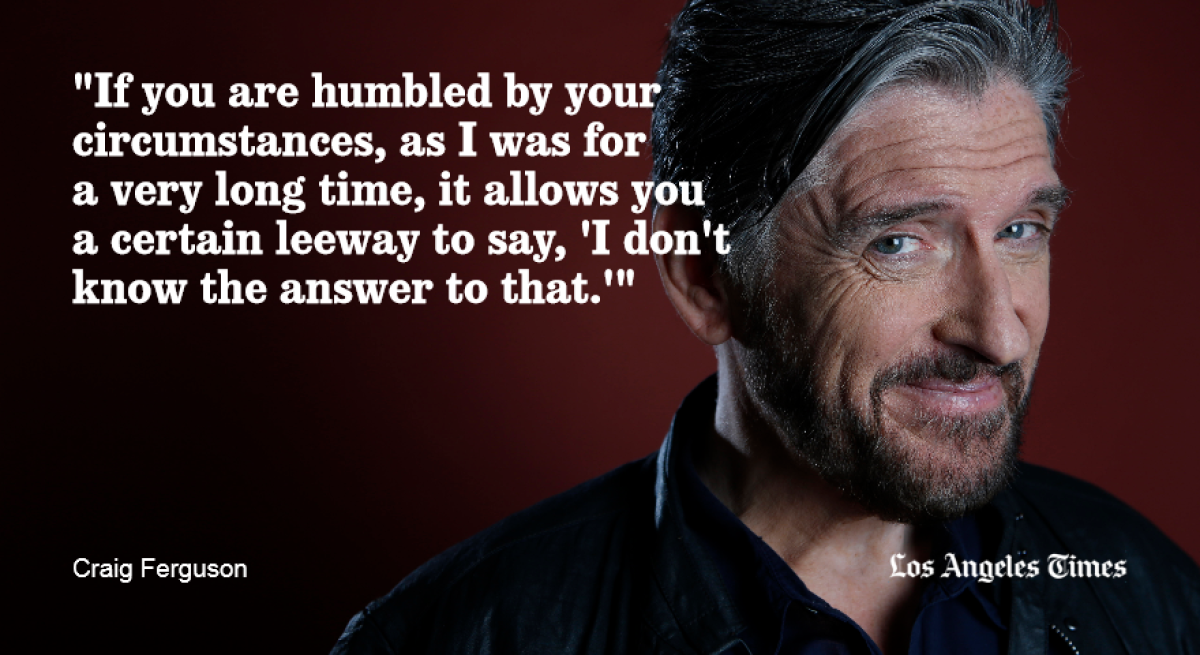Craig Ferguson once again cracks wise on the History Channel’s new panel show, ‘Join or Die’

Craig Ferguson at PMK-BNC in Los Angeles. The former late-night talk show host has a new sociopolitical comedy panel show, “Join or Die,” which premieres Feb. 18 on History Channel.
- Share via
It was a gray day in America when Craig Ferguson left CBS’ “The Late Late Show” in December 2014, a couple of weeks shy of a decade as its host. (James Corden, who sings, replaced him.)
Ferguson has not been exactly invisible since. There was a stand-up special, “Just Being Honest,” which aired over Epix in September, and even before his last “Late Late Show” episode aired he was hosting a syndicated game show, “Celebrity Name Game,” which earned him a Daytime Emmy award and has been renewed through 2017.
See more of Entertainment’s top stories on Facebook >>
But neither of those things really showcase what makes Ferguson singular, what set him off from other late-night hosts: the intimate relation with the camera and the audience watching him through it; his improvised monological essays; a readiness to follow an idea wherever it leads. Ferguson’s also had an openness about his failings, including a history of alcoholism that took him to the brink of a suicide (he has been sober since 1992), and shown a lack of interest in promoted products and canned stories, symbolized by the ritual tearing up of his note cards before every interview.
Ferguson was a magician showing you that there was nothing up his sleeve, except that there really was nothing up his sleeve, apart from his arm, tattooed with Benjamin Franklin’s 1754 famous political cartoon, the image of a segmented snake above the legend “Join or Die.”

That legend is also the title of Ferguson’s new History Channel series, a weekly panel show with a historical bent. Premiering at 11 p.m. Feb. 18, it puts Ferguson back in late night, chronologically speaking, but more important, it lets him run in a way that fans should find satisfying.
“It had a kind of zippy kind of ring about it, and because I got that [tattoo] stamped on when I became a citizen, it just felt right,” said the Scottish-by-birth, American-by-choice Ferguson of the show’s title on a recent afternoon in the neutral ground of a publicist’s office. As on “The Late Late Show,” he tends to lean back in his chair when he talks, as close to horizontal as is practicable, and he speaks more softly and slowly than when on camera. (Though certain subjects do turn up his volume.)
“Better than ‘Historical Discussions,’” he continued, pronouncing the words with an upper-crust British accent. “That would feel a little stuffy.”
Each half-hour episode has a theme (bad medical ideas, worst political blunder, most influential drug, most influential band, greatest Founding Father, history’s biggest frenemies), with six candidates for each title analyzed and argued over by Ferguson and his panel of three — typically a scholarly expert, a comedian and “someone I’ve talked to, liked and respected in the 10 years that I did the late-night show.” Guests in the last category will include Judd Apatow, Courteney Cox (an executive producer of “Celebrity Name Game”), Lisa Kudrow, Joel McHale, Julie Bowen, Jack Black, Jay Leno, Jimmy Kimmel and Chris Hardwick.
I think toward the end of late-night ... as I became done with it, it got a little mad.
— Craig Ferguson
“History Channel seemed like an obvious choice,” said Ferguson of his new series’ home, “because if you look at their programming, it’s vague. There are dramas about Vikings or there’s ‘Pawn Stars’ or ‘Ax Men’ or ‘Ice Truckers,’ so it’s a wide brief. I’m talking about history, but I can talk about ancient Egyptian hairstyling techniques or the best bands of the last 40 years; it’s not too specific.
“I also wanted to do a show where I knew what we were going to talk about and it wasn’t going to be … you. For example, if you’re Lars Ulrich and you’re coming to sit down with me [on “Join or Die”], we’re not going to talk about Metallica’s next album. You don’t have to sell anything to me; I know you’re very knowledgeable about music, I know you’re an interesting guy, and that’s what we’re going to do.”
The format provides just enough structure to give it a distinct flavor and focus — it’s not just a new Craig Ferguson talk show on a less moneyed network — without getting in the way of conversation. But as on “The Late Late Show,” he begins with a monologue, addressing the camera from below, within arm’s length. And here, as there, he doesn’t work with a teleprompter, just a list of bullet points. (“I don’t want to read it; if I read it, I’ll be reading it.”)
“I think toward the end of late-night as I got ... bored isn’t the right word, but as I became done with it, it got a little mad,” Ferguson said of his old late-night show. “I liked the horse and the skeleton” — he refers to the two-men-in-a-horse-suit Secretariat and his robot sidekick Geoff Petersen— “but I think it became a little too much of that. It’s difficult to have a discussion that suddenly turns serious when there’s a pantomime horse in the corner and a skeleton over there; so I started to limit myself in what we could talk about.

“What I felt I had to return to was the ability to have a genuine discussion which could be in turns funny, moving, shocking, interesting, flippant, frivolous and deadly serious, which is by far and away a more interesting set of notes,” he said. “If it was in musical terms, late-night had me playing the chord E, which is a great chord, but it’s not the only one. And I wanted to do an augmented F7. I don’t regret the show or wish to close the door on it in any way, I’m very proud of it, and I loved doing it. But it was the right time to say, ‘That’s enough of that.’”
Still, there were those who pegged Ferguson’s retirement to his not being offered, in what has come to seem the rules of succession, David Letterman’s job on the earlier “The Late Show,” when Letterman retired. He rejects that notion.
“That’s one of the odd things about that particular genre of television,” he said. “The minute I started at 12:30 the question became when and do you want and how are you going to get 11:30? But I never wanted 12:30, never mind 11:30. Why is that a thing?”
Ferguson says he became “under-attentive” and “distracted” in his early teens after a childhood as a straight-A student. “I was looking at other things, music and girls.” But even at his lowest, he was an inveterate reader: “I’m from Scotland and my family are about 80 or 90% Irish, you know — so Irish and Scottish, we’re literate drunks.
“I regret the lack of formal education. The thing about being an autodidact is that there’s huge gaps in certain areas; I have encyclopedic knowledge about some things, but I miss sources, I miss connections. I’m not foolish enough to think that being self-taught is better: I think it may allow for a certain freedom of expression and a certain vitality, but there’s plenty of academics that don’t lack that either. I mean, I regret not learning, you know, Greek and Latin.”
High-class regrets, for sure.
“I’ve got low-class regrets too,” he replied. “Maybe it’s just that I’m greedy, and that’s why I got a certain amount of knowledge is that I’m greedy for information — I’m not greedy financially, but you know I was certainly greedy for alcohol and drugs; my appetite was insatiable,” Ferguson said. “I’m quite a voracious eater. So I think there’s a certain appetite, and knowledge is part of that.”
It’s a valuable quality in a talk-show host.
“Sure. Give me information. I also think that if you are humbled by your circumstances, as I was for a very long time, it allows you a certain leeway to say, ‘I don’t know the answer to that.’ I see a lot of people in television that are frightened of looking stupid. I’m not. I’ve looked stupid plenty of times, I’ll look stupid again.
“I mean, there’s no academic value to this show. I’m not purporting that what we decide means anything. It’s a discussion show; it’s smart people saying interesting stuff on television. It’ll never work.”
ALSO:
First look at ‘Game of Thrones’ Season 6 shows who lives, and who died
Craig Kilborn is interviewed by the only person he trusts: himself
‘Deadpool’s’ ‘comic relief,’ T.J. Miller, didn’t really get the joke at first
More to Read
The complete guide to home viewing
Get Screen Gab for everything about the TV shows and streaming movies everyone’s talking about.
You may occasionally receive promotional content from the Los Angeles Times.







